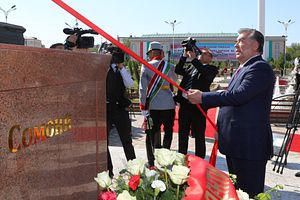What stands in the way of Tajikistan’s development? Unsurprisingly for regional observers, the answer is “an awful lot.”
A new World Bank report — a “Systematic Country Diagnostic” — assesses the impediments to Dushanbe achieving its ambitious National Development Strategy 2030 (NDS 2030) which was laid out in 2016. The NDS 2030, the World Bank notes, requires $118 billion to be fully implemented and targets raising the population’s living standards as the country’s ultimate goal.
The Rogun dam stands as the strategy’s “de facto centerpiece.” The report says that when fully commissioned in 2032, Dushanbe “envisages the Rogun HPP to significantly boost hydropower exports and remove energy shortages, contributing to growth, government revenue and, hence, poverty reduction.”
The NDS 2030 may be ambitious, but “clear guidance on implementation is lacking, such as the necessary policy measures, monitoring and implementation arrangements, and a realistic financing envelope.” It’s a nice plan, but Dushanbe doesn’t seem to be seriously trying to implement it — aside from scrounging for money to pour into Rogun.
The report (available here) is comprehensive in its assessment of Tajikistan’s development challenges and economic status. While couched in staid, inoffensive language, it touches on some of the serious issues impeding not just Tajikistan’s economic development but social progress overall. The private sector, in the World Bank’s assessment, holds the key to unlocking Tajikistan’s potential. But what stands in the way? Almost everything.
“International evidence suggests that countries rarely achieve sustainable economic and social development in the absence of effective state institutions,” the overview notes, going on to say, “Existing laws and regulations, including competition laws, need to be enforced to improve Tajikistan’s business environment and create pre-conditions for investment, innovation and job creation.”
Translation: Tajikistan lacks effective state institutions and doesn’t enforce its own laws in a comprehensive manner.
“Good governance, the fight against corruption, a sense of justice, and a level-playing field for all, would go a long way towards shifting the private sector into a key driver of growth and job creation, while boosting the state’s legitimacy,” the report’s overview reads.
The playing field, the report argues without stating it so simply, is tipped in the favor of the state — the state being President Emomali Rahmon and his extended family, specifically. Bad governance structures and rampant corruption underpin a system that lacks justice, and a system that lacks justice isn’t an attractive investment opportunity.
For a less veiled assessment of Tajikistan’s economic woes, take the time to read through four recent reports from the Organized Crime and Corruption Reporting Project (OCCRP) under the title “Tajikistan: Money by Marriage.” The reports offer a view on how a “modern kleptocracy” works: family connections, bribery, murder, and intimidation.
In “When the Country is a Business,” Vlad Lavrov and Olga Gein lay out the ways in which the business empire of Shamsullo Sakhibov, who is married to one of Rahmon’s daughters, has flourished because of its connection to the president. The growth of his company, Faroz, the report states, “was made possible, in large part, because the government created opportunities for it to flourish and ensured that none of its competitors would pose much of a threat. The state has been used for the good of the company, not the other way around.”
That, dear readers, is a non-level playing field.
As for an absent sense of justice: Faroz was founded by Umarali Kuvvatov and Sakhibov. In 2012, after Sakhibov married into the presidential family, Kuvvatov was squeezed out of the business he created by the partner he’d mentored. Turning from business to politics, Kuvvatov founded an opposition movement in exile and in 2015 was assassinated in the streets of Istanbul.
The World Bank report offers a sober assessment in technical terms, but the OCCRP reports put the technical economic problems experienced by Tajikistan into political context. And context is everything.

































